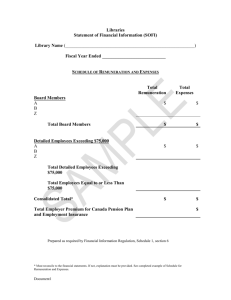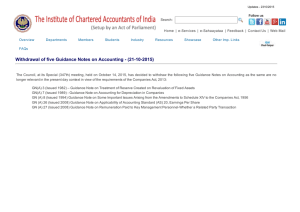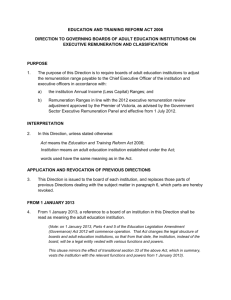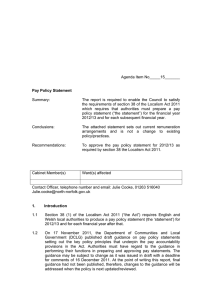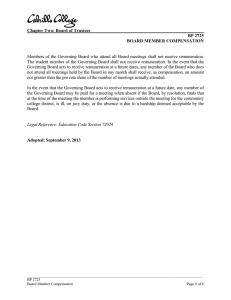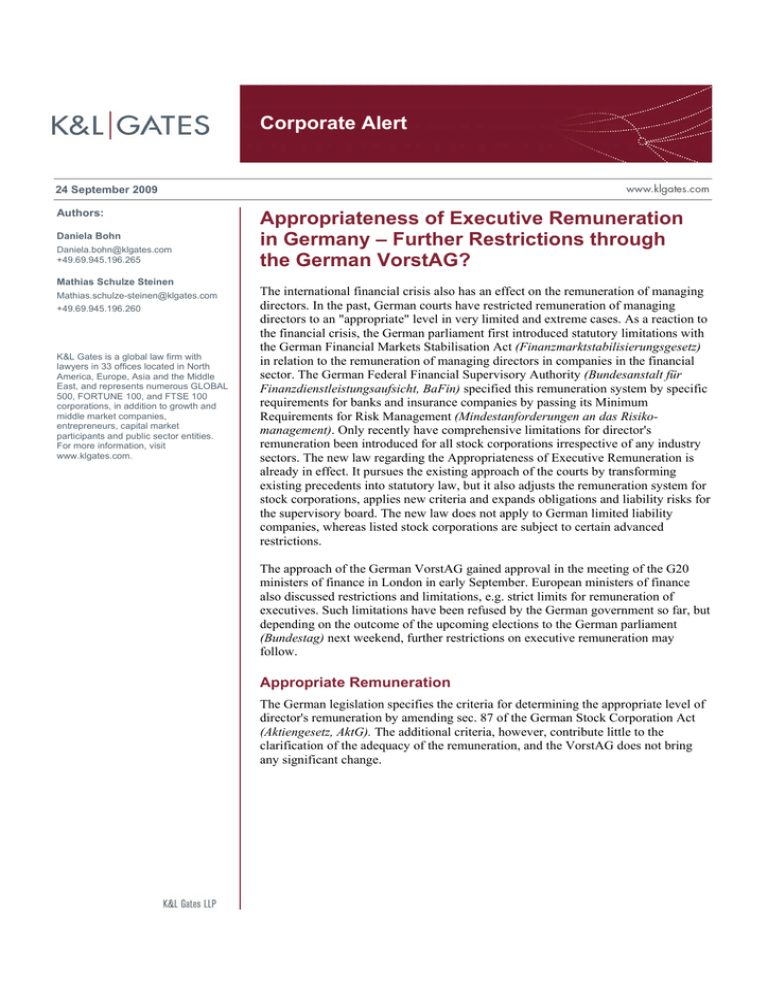
Corporate Alert
24 September 2009
Authors:
Daniela Bohn
Daniela.bohn@klgates.com
+49.69.945.196.265
Appropriateness of Executive Remuneration
in Germany – Further Restrictions through
the German VorstAG?
Mathias Schulze Steinen
Mathias.schulze-steinen@klgates.com
+49.69.945.196.260
K&L Gates is a global law firm with
lawyers in 33 offices located in North
America, Europe, Asia and the Middle
East, and represents numerous GLOBAL
500, FORTUNE 100, and FTSE 100
corporations, in addition to growth and
middle market companies,
entrepreneurs, capital market
participants and public sector entities.
For more information, visit
www.klgates.com.
The international financial crisis also has an effect on the remuneration of managing
directors. In the past, German courts have restricted remuneration of managing
directors to an "appropriate" level in very limited and extreme cases. As a reaction to
the financial crisis, the German parliament first introduced statutory limitations with
the German Financial Markets Stabilisation Act (Finanzmarktstabilisierungsgesetz)
in relation to the remuneration of managing directors in companies in the financial
sector. The German Federal Financial Supervisory Authority (Bundesanstalt für
Finanzdienstleistungsaufsicht, BaFin) specified this remuneration system by specific
requirements for banks and insurance companies by passing its Minimum
Requirements for Risk Management (Mindestanforderungen an das Risikomanagement). Only recently have comprehensive limitations for director's
remuneration been introduced for all stock corporations irrespective of any industry
sectors. The new law regarding the Appropriateness of Executive Remuneration is
already in effect. It pursues the existing approach of the courts by transforming
existing precedents into statutory law, but it also adjusts the remuneration system for
stock corporations, applies new criteria and expands obligations and liability risks for
the supervisory board. The new law does not apply to German limited liability
companies, whereas listed stock corporations are subject to certain advanced
restrictions.
The approach of the German VorstAG gained approval in the meeting of the G20
ministers of finance in London in early September. European ministers of finance
also discussed restrictions and limitations, e.g. strict limits for remuneration of
executives. Such limitations have been refused by the German government so far, but
depending on the outcome of the upcoming elections to the German parliament
(Bundestag) next weekend, further restrictions on executive remuneration may
follow.
Appropriate Remuneration
The German legislation specifies the criteria for determining the appropriate level of
director's remuneration by amending sec. 87 of the German Stock Corporation Act
(Aktiengesetz, AktG). The additional criteria, however, contribute little to the
clarification of the adequacy of the remuneration, and the VorstAG does not bring
any significant change.
Corporate Alert
The previous version of sec. 87 para. 1 of the AktG
already provided guidelines in relation to the
"appropriate" remuneration of members of the
managing board. It linked the appropriateness of the
remuneration to the tasks of the managing director
and the status of the company. The new statutory
provisions specify the obligation to take into account
the director's performance. This is not innovative,
since German courts and the German Corporate
Governance Codex already required consideration of
the performance of the members of the managing
board. As an additional criterion, the new law
defines the requirement not to exceed the "usual"
remuneration without good reasons when
determining director's remuneration. Sector specifics
and market standards in Germany as well as the
remuneration matrix in the specific company are
supposed to serve as references for the determination of the "usual" remuneration.
Since the German legislation aimed to provide
corporations with specific guidelines without
limiting the entrepreneurial freedom too much, the
newly introduced terms are very indefinite and leave
a lot of room for interpretation. It will take years
until the first court precedents will give some
guidance in determining how to value the
performance of members of the managing board.
Variable Remuneration
Since the German government has identified shortterm remuneration as one factor being responsible
for the financial crisis, new statutory legal
provisions have been introduced by the VorstAG
which aim to support pay for long-term
performance.
According to the opinion of BaFin and the German
government, existing remuneration structures in
listed corporations, in particular profit-sharing
programs, rewarded short-term investments which
do not necessarily have a positive impact on the cash
value of the corporation. False behavioural
incentives can arise from payment instruments set up
for short periods of time. This has already been
criticized by German courts in the past. Courts decided that appreciation premiums that are rewarded
for successful performance without a contractual
basis and any incentive for future performance shall
be illegitimate.
The purpose of the VorstAG is that payment must
be adequate overall and the conduct of the board
must be oriented towards sustainable and long-term
company success. The new VorstAG adds further
restrictions to variable remuneration by transferring
and expanding an existing non-binding
recommendation of the German Corporate
Governance Codex into German law that variable
remuneration of the managing board in listed
corporations is supposed to align with sustainable
development of the corporation. As a matter of
principle, variable remuneration shall have a
perennial basis. Pursuant to the legislation, perennial shall mean a minimum of four years. In
addition, negative developments affecting the
corporation shall be taken into account and
limitations for extraordinary developments in the
corporation, such as takeovers, sale of business or
liquidation of capital reserves, shall take effect. The
VorstAG does not ultimately prohibit short-term
payment incentives. Even in the future, a mixture of
short-term and long-term payment components will
be possible, provided that there is an incentive for
sustainable economic activity in the overall result.
Therefore, short-term incentives must be well
balanced with long-term components.
Many corporations today have payment systems
with long-term components. Future court precedents
on the new law will show whether there will be an
adaption in the ratio of fixed salary to incentive
schemes, i.e. annual bonuses, profit-sharing and
long-term payment. In any event, the set-up of
incentive payments will become more complicated.
An increase in the share of long-term components in
the total compensation is to be expected.
In particular, provisions regulating stock options
granted to the managing board have been affected
by new legislation. In the future, stock options shall
be exercised at the earliest after four years; existing
law only required a holding period of two years.
Although not expressly defined, the same will most
likely apply to phantom stocks and stock
appreciation rights considering the overall intention
to encourage long-term investments. Further limitations apply to group-wide stock option programs in
groups of companies. Statutory provisions are
supplemented by court precedents which stipulate
that variable remuneration must be based on
individual performance or business performance of
24 September, 2009
2
Corporate Alert
the relevant subsidiary in the group. Variable elements of the remuneration which are based on the
performance of the parent company must be limited
to a lightweight part of the overall remuneration. As
a consequence, German board members will not be
eligible to take part in group-wide stock option plans
that link the benefit to the profit of the parent
company.
Existing stock option programs will not be affected
by the new provisions. Nevertheless, corporations
must take into account the new law when setting up
or modifying new programs in favour of the
members of their managing board.
Reduction of Remuneration
The new law introduces further obligations for the
supervisory board in respect to the revision of
director's remuneration and pensions in the case of a
deterioration of the corporation's performance.
The supervisory board is supposed to reduce
remuneration of the managing board or pension
payments to an appropriate level if payment of
unmodified remuneration would be inappropriate,
i.e. in case of job redundancies, salary cuts and in
case no profits can be distributed. An imminent
crisis or insolvency of the corporation will not be
required. Cutting of pensions shall be limited to the
first three years after the member of the managing
board has left the company. Since the reduction of
remuneration is a unilateral action initiated by the
supervisory board and without the consent of the
director, it would be recommendable to add certain
wording in the employee's contract of members of
the managing board reflecting the statutory
provision.
Responsibility for Director's
Remuneration
Pursuant to the VorstAG, it is the job of the supervisory board to determine the adequacy of the
compensation of its corporate bodies. The law itself
contributes little to the clarification of the adequacy
of the compensation, rather it increases the responsibility and liability of the supervisory board.
In order to increase transparency, decisions on the
remuneration of the board must be made by the
plenum of the supervisory board with a majority
vote. The decision cannot be delegated to a
committee; however, committees may perform a
preparatory function. This corresponds with the
overall responsibility for remuneration issues and
liability of the members of the supervisory board in
the case of inappropriate determination of the
executive remuneration. Members of the supervisory board shall be liable for damages towards
their corporation if they do not observe restrictions
defined by statutory law and when de-termining
remuneration for the managing board. In addition,
they face criminal liability, i.e. a custodial sentence
with a maximum of up to 5 years or a fine. German
courts acknowledged personal liability of members
of the supervisory board already in the past, but now
it is expressly defined in Sec. 116 of the AktG.
In listed companies, shareholders shall have the
ability to control an existing remuneration structure.
Based on the existing recommendation in the
German Corporate Governance Codex, the supervisory board shall be required to report on the
remuneration structure of the managing board if
requested by the general meeting. The general
meeting shall be entitled to render a non-binding
vote on the remuneration structure for the managing
board. Despite its non-binding nature, a vote of the
shareholders will put factual pressure on the
supervisory board and reduce liability risks
provided that the supervisory board adheres to the
vote.
Transparency in Director's
Remuneration
Existing disclosure requirements in relation to
remuneration of managing directors have been
extended by the VorstAG.
Since 2005, German statutory law requires stock
corporations to disclose certain information on
remuneration and other benefits of their managing
board in the annex to the corporation's annual
accounts. Mandatory disclosures include (i) overall
annual salary of the managing board and any other
corporate bodies as well as other benefits and (ii)
overall payments to previous members of the
managing board. The VorstAG requires additional
disclosure of (i) benefits, which shall be paid in the
case of early or regular termination of a director's
position, as well as accruals in this respect, and (ii)
all amendments to the remuneration during a
24 September, 2009
3
Corporate Alert
business year. Pursuant to the new legislation, it will
be necessary to specify all payment information in
relation to every individual member of the managing
board, whereas previous law only required
disclosure of general information on the overall
payments to the relevant corporate bodies.
Further Important Amendments
In the case of D&O insurances for managing
directors, corporations must agree on a participation
in the deductible for each managing director with a
minimum of 1.5 times the regular fixed salary. It is
arguable whether this new provision will increase
the sense of responsibility since there are many ways
to circumvent the new legislation. In practice, for
example, insurance companies offer additional
insurances which shall cover the participation
amount.
New legislation has also introduced a "cooling-off"
period for a subsequent membership on the
supervisory board following upon a position on the
managing board of the corporation. Members of the
managing board of a corporation are not allowed to
become members of its supervisory board for a
period of two years upon their retirement from the
managing board unless nominated by shareholders
with a minimum of 25 per cent. of the voting rights
in the corporation.
Anchorage Austin Beijing Berlin Boston Charlotte Chicago Dallas Dubai Fort Worth Frankfurt Harrisburg Hong Kong London
Los Angeles Miami Newark New York Orange County Palo Alto Paris Pittsburgh Portland Raleigh Research Triangle Park
San Diego San Francisco Seattle Shanghai Singapore Spokane/Coeur d’Alene Taipei Washington, D.C.
K&L Gates is a global law firm with lawyers in 33 offices located in North America, Europe, Asia and the Middle East, and represents numerous
GLOBAL 500, FORTUNE 100, and FTSE 100 corporations, in addition to growth and middle market companies, entrepreneurs, capital market
participants and public sector entities. For more information, visit www.klgates.com.
K&L Gates comprises multiple affiliated partnerships: a limited liability partnership with the full name K&L Gates LLP qualified in Delaware and
maintaining offices throughout the U.S., in Berlin and Frankfurt, Germany, in Beijing (K&L Gates LLP Beijing Representative Office), in Dubai,
U.A.E., in Shanghai (K&L Gates LLP Shanghai Representative Office), and in Singapore (K&L Gates LLP Singapore Representative Office); a
limited liability partnership (also named K&L Gates LLP) incorporated in England and maintaining offices in London and Paris; a Taiwan general
partnership (K&L Gates) maintaining an office in Taipei; and a Hong Kong general partnership (K&L Gates, Solicitors) maintaining an office in Hong
Kong. K&L Gates maintains appropriate registrations in the jurisdictions in which its offices are located. A list of the partners in each entity is
available for inspection at any K&L Gates office.
This publication is for informational purposes and does not contain or convey legal advice. The information herein should not be used or relied upon
in regard to any particular facts or circumstances without first consulting a lawyer.
©2009 K&L Gates LLP. All Rights Reserved.
24 September, 2009
4

